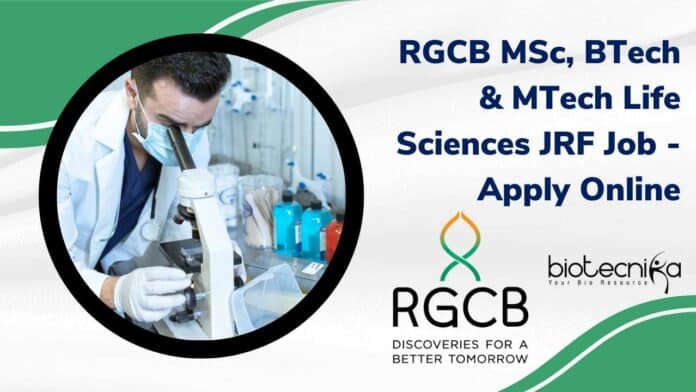RGCB BTech JRF Job – MSc & MTech Candidates Apply Online
RGCB BTech JRF Job – MSc & MTech Candidates Apply Online. Rajiv Gandhi Centre for Biotechnology Job. JRF RGCB job. Interested and eligible applicants can check out all of the details on the same below –
If you are wondering how the interview questions will be for the role of Junior Research Fellow at RGCB, then make sure you check out all of the questions at the bottom of the page.
This job expires in
#Adv. # 20/2023
Applications are invited from suitable candidates for one position of Junior Research Fellow in a SERB-DST funded research project entitled “Genomic and metagenomics insights on Helicobacter pylori virulence and antimicrobial resistance” in the Laboratory of Dr. Santanu Chattopadhyay at Rajiv Gandhi Centre for Biotechnology, Thiruvananthapuram.
Name of the Post – Junior Research Fellow
No. of Posts – 01
Name of the PI – Dr. Santanu Chattopadhyay
Age – Below 28 years as on July 14, 2023. Age relaxation will be given as per Govt. of India norms.
Duration – Initially for a period of one year and extendable for one more year or till termination of the project whichever is earlier based on performance evaluation on a yearly basis.
Selection Process & Instructions –
- Applications should be submitted online.
- Candidates who are currently working in Government firms should send applications through proper channels.
- The last date for receiving completed applications is July 14, 2023.
- If a candidate wishes to apply for different positions, separate applications should be submitted for each position. Selection of the position will not entitle the candidate to any future positions at RGCB (permanent or otherwise). As with all project positions at RGCB, the position will be co-terminus with the end of the project.
Applications which are not in the prescribed format will summarily be rejected.
Only those fulfilling the above criteria need to apply. Applicants will be shortlisted for the ONLINE selection interview based on eligibility criteria. Selection of suitable candidates will be made based on qualifications and performance in the selection interview.
Essential Qualifications – The candidate must have good academic track records with first class in M.Sc/ B.Tech/M.Tech in Life sciences (including but not limited to Microbiology/ Biotechnology/Zoology/Physiology) or Bioinformatics or Computer Science from a recognized University.
Emoluments – ₹31,000/- + 16% HRA.
Are you looking for some possible interview questions for the role of Junior Research Fellow at RGCB, then read below
- Can you explain your understanding of the research project titled “Genomic and metagenomics insights on Helicobacter pylori virulence and antimicrobial resistance”? How do you think your background and skills align with the objectives of this project?
Answer: The research project aims to gain insights into the virulence and antimicrobial resistance of Helicobacter pylori using genomic and metagenomic approaches. My understanding of the project is that it involves studying the genetic characteristics and diversity of H. pylori strains and their association with virulence factors and antimicrobial resistance. As someone with a strong academic background in life sciences, particularly in microbiology and biotechnology, I believe my knowledge and skills in these areas, along with my experience in genomic analysis and data interpretation, make me well-suited for contributing to the project’s objectives.
- How familiar are you with the techniques and methods commonly used in studying Helicobacter pylori? Can you provide examples of relevant laboratory techniques or assays you have performed in your previous research or academic projects?
Answer: In my academic and research endeavors, I have gained familiarity with various techniques commonly used in studying Helicobacter pylori. These include culturing and isolation of bacterial strains, PCR-based methods for detecting virulence genes or antimicrobial resistance genes, DNA sequencing, and bioinformatics analysis of genomic data. For example, I have performed PCR assays to detect specific genes in H. pylori strains and analyzed the resulting data to understand their genetic characteristics. Additionally, I have used bioinformatics tools to analyze DNA sequences and identify potential virulence factors or genetic determinants related to antimicrobial resistance.
- How do you plan to contribute to the project’s objectives in terms of experimental design and data analysis? Can you describe your approach to handling and interpreting complex genomic or metagenomic data?
Answer: In this project, I would actively contribute to experimental design by collaborating with the research team and the principal investigator. I would propose appropriate methodologies and techniques for studying H. pylori virulence and antimicrobial resistance based on the project’s objectives. Regarding data analysis, I would leverage my expertise in bioinformatics and computational biology to handle and interpret complex genomic or metagenomic data. This includes employing specialized software and databases for sequence analysis, comparative genomics, and metagenomic profiling. I would carefully analyze the data, identify patterns or genetic variations of interest, and correlate them with the phenotypic characteristics of H. pylori strains under investigation.
- Have you previously worked on a research project that involved working with microbial virulence or antimicrobial resistance? If yes, can you provide an example of the research question, methods used, and your contributions to the project?
Answer: Yes, I have worked on a research project focused on studying microbial virulence and antimicrobial resistance. In that project, we aimed to investigate the mechanisms of antibiotic resistance in a specific bacterial pathogen. We employed a combination of molecular biology techniques, such as plasmid isolation, transformation, and conjugation, to understand the transfer of resistance genes among bacterial strains. Additionally, we performed antimicrobial susceptibility testing using various methods, such as disk diffusion or broth microdilution, to assess the resistance profiles of different strains. My specific contributions to the project included designing and conducting experiments, analyzing the results, and assisting in the interpretation of the findings in collaboration with the research team.
- How do you ensure accuracy and reliability in your scientific work? Can you describe your approach to quality control and data validation in the laboratory or research setting?
Answer: Ensuring accuracy and reliability in scientific work is paramount. In the laboratory or research setting, I prioritize several measures for quality control and data validation. Firstly, I follow standard operating procedures (SOPs) and protocols meticulously, maintaining consistency in experimental procedures. I also implement appropriate positive and negative controls to validate the accuracy of my experiments. Regular calibration and maintenance of laboratory equipment are essential to obtain reliable results. Additionally, I document all experimental details, observations, and results accurately and in a timely manner. Finally, I engage in peer discussions and review processes to validate findings and ensure rigorous scientific standards are upheld.
Editor’s Note: RGCB BTech JRF Job – MSc & MTech Candidates Apply Online. Please ensure that you are subscribed to the Biotecnika Times Newsletter and our YouTube channel to be notified of the latest in the industry. Follow us on our social media like Twitter, Telegram, Facebook






























